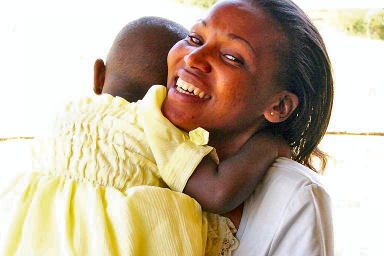World AIDS Day: supporting children and families
30/11/2006
1 December sees the global community joining together for World AIDS Day and working to tackle one of the greatest challenges mankind has ever seen, the HIV/AIDS epidemic. An estimated 38.6 million people worldwide were living with AIDS in 2005, including 2.3 million children. Last year, an estimated 4.1 million people became newly infected with HIV and 2.8 million lost their lives to AIDS (UNAIDS, 2006).
Stop AIDS. Keep the Promise is the theme for 2006 - an appeal to governments and policy makers to ensure they meet the targets they have set in the fight against HIV/AIDS.
SOS Children has been working on HIV/AIDS issues for a number of years, helping families affected by HIV/AIDS through education, advocacy and family strengthening programmes. In 2005, SOS Children's Villages supported more than 27,000 children affected by HIV/AIDS, the vast majority of whom live in sub-Saharan Africa.
One of the countries in which SOS Children is working hard to tackle HIV and AIDS is Rwanda, a country blighted by years of civil war and poverty and now facing a new challenge in the form of HIV/AIDS. SOS Children, however, is helping affected families through these difficult times, with food rations, counselling and vocational training as well as medical support. One woman who has benefited from the support of her local SOS Social Centre is Madeleine. Read her story.
Life with HIV/AIDS

Madeleine discovered she was HIV-positive in 2002, just after her husband's death. One year later she learned that two of her children were also HIV-positive. Without any means of support, Madeleine was unable to take care of herself or her children. "I had to cover our medical expenses, feed the children, buy their school books and uniforms and pay for their school fees all on my own. I felt like I was falling into a gulf because there was nobody to help me. I wondered what was going to happen to us. It was a really difficult time for me," she recalled.
It was especially difficult because Madeleine was unable to work due to her illness. She was living from day to day wondering how her family would survive. "I lost hope in everything; I couldn’t see any sense in my life," she remembered. "I had no money and I had nobody to help me. I knew that I could never take care of my family under those circumstances."
Support from the SOS family strengthening programme came at a crucial time for Madeleine. "Today, my family's life has changed so much," she said. "Having the support of SOS Children brought so many changes in our lives at home. We are now able to eat well every day. The food we receive each month is so important, because without it we wouldn't be healthy and I wouldn't have the necessary strength to work.
Another important thing is that the children are able to go to school again. Before, they were regularly expelled from their school because their fees hadn’t been paid or they didn’t have the right books. Today, I am so relieved because we don’t have to worry about this any more. Their progress is good and so are their results! We have easy and free access to HIV treatment. We are less and less ill - we are less sad now."
Madeleine also sells clothes as part of an SOS income-generating project, which allows her to earn some money to cover the small daily necessities of the family. "Now I have a lot of hope my family's condition is no longer a major concern for me as I have a good and solid support. I thank SOS Children for thinking about people like us, and I hope that they will always be present to restore our hope," she said with a smile.
More about AIDS in Africa
HIV/AIDS is a major problem around the world, but nowhere more so than in sub-Saharan Africa, where over 16 million people are affected by the disease. Awareness programmes and support for children and their families affected by HIV/AIDS are becoming an increasingly important part of SOS Children's work in the region. Read more about our efforts to combat HIV/AIDS in Africa.
Relevant Countries: Rwanda.